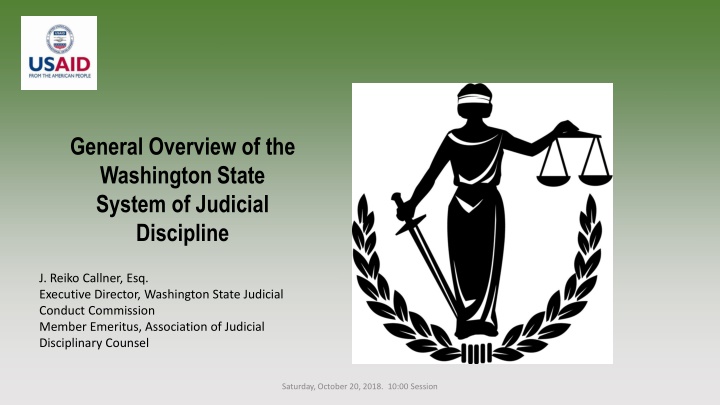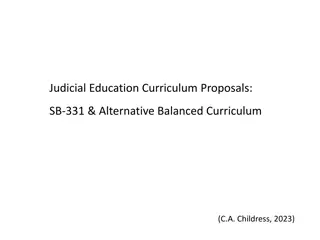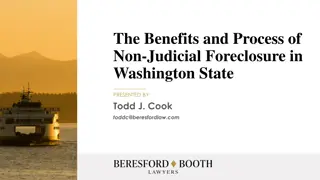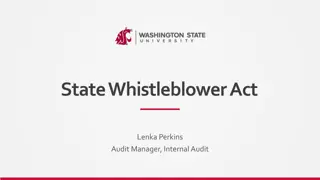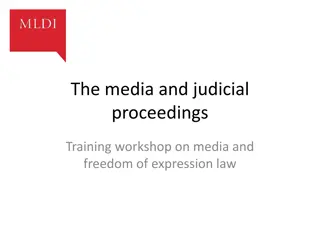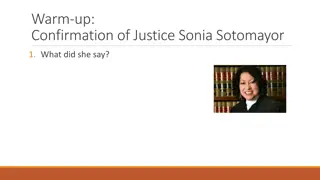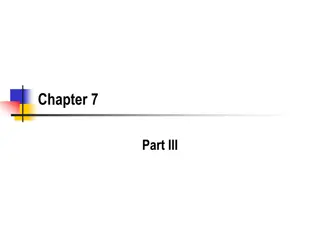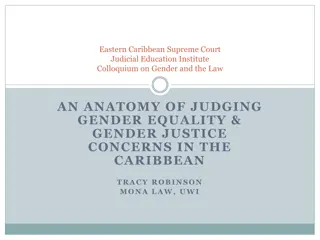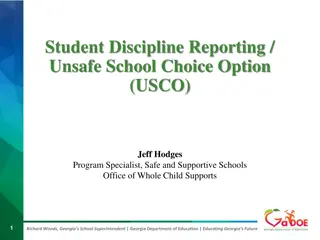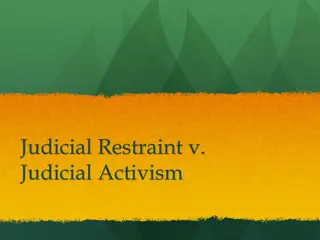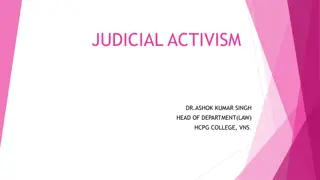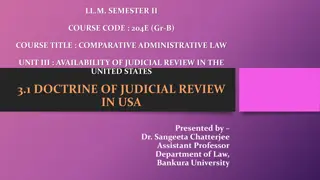Overview of Washington State Judicial Discipline System
The Washington State system of judicial discipline aims to ensure accountability and safeguard judicial independence. It enforces a Code of Judicial Conduct with canons focused on upholding integrity, impartiality, and avoiding impropriety. Each canon contains enforceable rules, and comments provide guidance and aspirational goals for judges. The composition of the Commission on Judicial Conduct includes lawyer, public, and judge members to maintain fair oversight.
Download Presentation

Please find below an Image/Link to download the presentation.
The content on the website is provided AS IS for your information and personal use only. It may not be sold, licensed, or shared on other websites without obtaining consent from the author.If you encounter any issues during the download, it is possible that the publisher has removed the file from their server.
You are allowed to download the files provided on this website for personal or commercial use, subject to the condition that they are used lawfully. All files are the property of their respective owners.
The content on the website is provided AS IS for your information and personal use only. It may not be sold, licensed, or shared on other websites without obtaining consent from the author.
E N D
Presentation Transcript
General Overview of the Washington State System of Judicial Discipline J. Reiko Callner, Esq. Executive Director, Washington State Judicial Conduct Commission Member Emeritus, Association of Judicial Disciplinary Counsel Saturday, October 20, 2018. 10:00 Session
Dual Responsibilities Ensure Accountability& Safeguard Judicial Independence A judicial enforcement entity should protect the integrity of the judicial process and promote public confidence in the courts. It should do so by enforcing a consistent and transparent Code of Ethics. It should also improve and strengthen the judiciary by creating in judges a greater awareness of proper judicial behavior. Equally importantly, a judicial enforcement entity should provide due process to judges, and not allow unsubstantiated allegations of misconduct to damage judges reputations. Judges should be free to make hard decisions without fear.
Code of Judicial Conduct Canon 1: A JUDGE SHALL UPHOLD AND PROMOTE THE INDEPENDENCE, INTEGRITY, AND IMPARTIALITY OF THE JUDICIARY, AND SHALL AVOID IMPROPRIETY AND THE APPEARANCE OF IMPROPRIETY. Canon 2: A JUDGE SHOULD PERFORM THE DUTIES OF JUDICIAL OFFICE IMPARTIALLY, COMPETENTLY, AND DILIGENTLY. Canon 3: A JUDGE SHALL CONDUCT THE JUDGE S PERSONAL AND EXTRAJUDICIAL ACTIVITIES TO MINIMIZE THE RISK OF CONFLICT WITH THE OBLIGATIONS OF JUDICIAL OFFICE. Canon 4: A JUDGE OR CANDIDATE FOR JUDICIAL OFFICE SHALL NOT ENGAGE IN POLITICAL OR CAMPAIGN ACTIVITY THAT IS INCONSISTENT WITH THE INDEPENDENCE, INTEGRITY, OR IMPARTIALITY OF THE JUDICIARY.
Each Canon Contains Rules Which are Enforceable by Discipline Example: Rule 1.3: A judge shall not abuse the prestige of judicial office to advance the personal or economic interests* of the judge or others, or allow others to do so.
Comments Accompany the Rules The Comments provide guidance on the purpose, meaning, and proper application of the rules. They also identify aspirational goals for judges.
Comment example: Comment example:
Members and Alternate Members Members and Alternate Members Commission on Judicial Conduct Commission on Judicial Conduct 2 Lawyer Members & 2 Alt. Lawyer Members Appointed by State Bar Association 18% 6 Public Members & 6 Alt. Public Members Appointed by Governor 55% 3 Judge Members & 3 Alt. Judge Members Appointed by Judicial Associations 27%
Members Policies Members Policies General Policies Participation, attendance; Communication, removal and enforcement; Rules of Conduct; Proceedings; Disqualification (conflict, bias); Personnel administration; Financial rules
Dismissals vs. Sustainments 1981-2018 Sustainments 3.1% Dismissals 96.9%
Sanctions Sanctions Admonition Reprimand Censure -with or without recommendation for suspension or removal
Aggravating and Mitigating Factors Aggravating and Mitigating Factors Characteristics of Misconduct. (A) Whether the misconduct is an isolated instance or evidence of a pattern of conduct; (B) The nature, extent, and frequency of occurrence of the acts of misconduct; (C) Whether the misconduct occurred in or out of the courtroom; (D) Whether the misconduct occurred in the judge's official capacity or in the judge's private life; (E) Whether the judge flagrantly and intentionally violated the oath of office; (F) The nature and extent to which the acts of misconduct have been injurious to other persons; (G) The extent to which the judge exploited the judge's official capacity to satisfy personal desires; and (H) The effect the misconduct has upon the integrity of and respect for the judiciary.
Aggravating and Mitigating Factors Aggravating and Mitigating Factors Service and Demeanor of the Judge. (A) Whether the judge has acknowledged or recognized that the acts occurred; (B) Whether the judge has evidenced an effort to change or modify the conduct; (C) The judge's length of service in a judicial capacity; (D) Whether there has been prior disciplinary action concerning the judge; (E) Whether the judge cooperated with the commission investigation and proceeding; and (F) The judge's compliance with an opinion by the ethics advisory committee shall be considered by the commission as evidence of good faith.
Complaints by Type of Allegation 1981 - 2015 Disagree w/ruling 27% Failure to perform duties 21% Bias 15% Other 11% Criminal behav. 2% Admin. irregularity 2% Ex parte 3% Injudicious temper. 8% Abuse of office 3% Corruption 4% Conflict of interest 4%
Source of Complaints 6000 5500 5000 4500 4000 3500 3000 2500 2000 1500 1000 500 0
